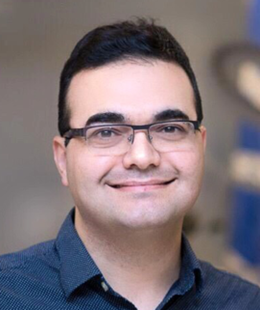Mohammad Al Janaideh

Find Related People by Keyword
Instrumentation & Capabilities
- Piezoceramic actuators, MATLAB data acquisition card, wafer handling robot, advanced scanning stage, laser vibrometers, laser interferometer, electromagnetic actuators.
- This equipment suite allows for high-precision control, sensing, and automation essential in advanced research and industrial applications. The piezoceramic actuators and electromagnetic actuators enable ultra-fine movements and positioning critical for microfabrication and robotics. The MATLAB data acquisition system facilitates real-time monitoring and analysis of dynamic systems. The wafer handling robot and advanced scanning stage support automated sample manipulation and high-resolution imaging. Laser vibrometers and interferometers provide non-contact, ultra-sensitive measurements of vibration, displacement, and surface profiles. Together, these tools support cutting-edge developments in smart manufacturing, material testing, semiconductor processing, and automated inspection systems.
Education & Employment Background
Mohammad Al Janaideh has held postdoctoral positions in the Department of Electrical and Computer Engineering at the University of Toronto, the Department of Aerospace Engineering at the University of Michigan, Ann Arbor, and the Department of Electronics and Systems at the University of Bologna, Italy. Dr. Al Janaideh also worked as a Senior Mechatronics Engineer at ASML in Connecticut, USA. He was a faculty member in the Department of Mechanical Engineering at Memorial University in St. John’s, Newfoundland and Labrador. He is also currently an Adjunct Professor in the Department of Electrical and Computer Engineering at the University of Toronto.
Research Themes
Dr. Al Janaideh is a leading expert in precision motion systems for EUV lithography, advancing actuator modeling and control for semiconductor manufacturing. He developed exact inverse models for smart materials like piezoceramics, enabling real-time control without feedback sensors. He collaborates with ASML and Quanser and mentors diverse researchers in an inclusive lab. His work on CAV networks addresses human-in-the-loop dynamics and cyber-physical delays using machine learning. He has also proposed robust control models for robotic platoons and designed MEMS energy harvesters that convert vibrations into electricity, promoting sustainability through AI-based modeling, microfabrication, and low-power circuit integration.
Current Research Themes
- Precision motion control for semiconductor systems, focused on wafer scanners. Impact: Increases fabrication throughput and accuracy.
- Hysteresis modeling in piezoceramic actuators for precise positioning. Impact: Enhances nanoscale motion control and stability.
- Control of electromagnetic actuators for advanced automation. Impact: Enables efficient, scalable motion systems.
- Machine learning for fault detection in IoT-connected autonomous vehicles. Impact: Boosts safety through real-time diagnostics and predictive maintenance.
- Piezo-MEMS energy harvesters using transfer learning for integration. Impact: Improves power efficiency in self-powered microsystems.
Highlights
- Major Funding: CFI JELF, NSERC Allinace, NSERC RTI, NSERC DG, Mitacs Accelerate.
- Awards: Fraunhofer-Bessel Research Award-Germany, European Structural and Investment Funds Award-Czech Republic, Fulbright-USA, Erasmus Mundus award-Italy, and The Scientific and Technological Research Council of Turkey Award, Turkey.
- National/International Recognition: Fraunhofer-Bessel Research Award – Germany (First Canadian to receive this prestigious award); among the top 2% most cited scientists.
- Professional Affiliations: Dutch Society for Precision Engineering, Robotics and Automation Society, The American Society of Mechanical Engineers, Institute of Electrical and Electronics Engineers, Professional Engineer license holder in Ontario.